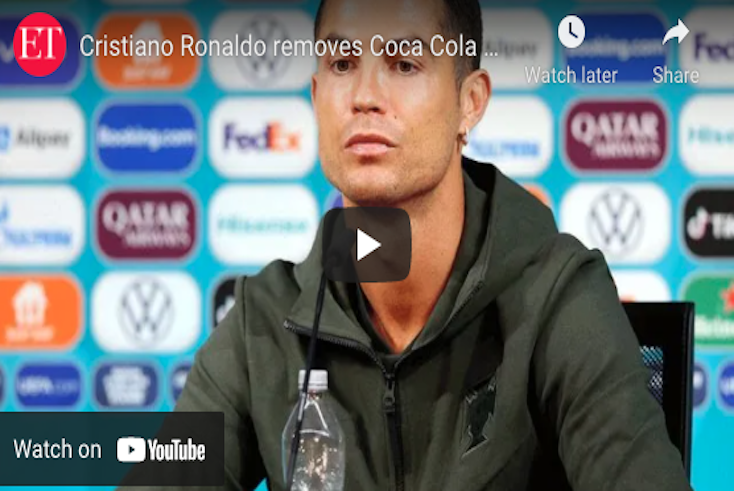Optimism revelation; GB News part 2; Ronaldo 1, Coke 0

Dominic Mills finds reasons to be optimistic, the targets of the Stop Funding Hate campaign too limited and Cristiano Ronaldo a rebellious inspiration
I’ve been thinking about crises quite a lot recently, and in the course of doing so stumbled across three things people often say about them.
Let me explain: it’s thanks to those nice people at ITV who asked me to do a short talk for their Showcase event last week. “Could you do four minutes on why you feel optimistic about the industry,” they asked.
“Er……right,” I said, my thoughts immediately turning to crisis, that being the state the industry found itself in March 2020.
But actually even before the pandemic things weren’t especially good.
Self-confidence was low; there was a lack of respect and trust between agencies and clients; there was a lack of respect for the customer; straw clutching — tech, big P Purpose — was rife; there was a disconnect from the real world; sclerotic working practices; and a de-emphasis on creativity.
These things had become the norm.
It was flight or fight time, and fight kicked in. And now…well, I see things differently. In fact, with a bit of thought, it was only a small jump towards being optimistic.
Resilience; agility; flexibility; more partnerships and mutual respect; higher levels of trust; a reappraisal of the value of proven and trusted media; a re-emergence of the value of the brand; a focus on community — however brands chose to interpret that; and a more realistic, and more nuanced — small p, if you like — focus on purpose.
All these qualities are present.
So the first thing people say about a crisis is that it builds character — in that Nietzschean “what-doesn’t kill-me-makes-me-stronger” way.
And that is an interesting way of looking at it.
But the second thing people say abut a crisis is that it reveals character, and that is an interpretation I prefer.
That’s because I think all these characteristics have always been present in our business — by no means universally or equally distributed — but, collectively, they had been forgotten or ignored or pushed away.
It took a crisis for the industry to get back to the old normal, for character to reveal itself.
[advert position=”left”]
The third thing people say about a crisis is that it should never be allowed to go to waste. That would be criminal. It’s too early to say, as we emerge from this 15-month hiatus, which direction we will go in. But I’m making a plea for the old normal.
And in the meantime, the economy is on steroids and spend is booming.
See… plenty of reason to be optimistic.
GB News Part 2
The last week has seen an unprecedented amount of coverage in the mainstream media about Stop Funding Hate’s campaign to persuade advertisers to boycott GB News.
It’s clearly had some success — all those grovelling apologies from Ikea, Kopparberg and a clutch of brands that revealed themselves to have spines of jelly— but by no means can it claim victory.
My colleague Omar Oakes drew attention to the Co-op’s principled stand against Stop Funding Hate . And a quick check over the weekend shows some others hanging in there.
HM Government, for example, the Postcode Lottery, Marks Electricals, Appeal Blinds, and Workday enterprise software. There were also ads for Sky Broadband and Discovery +, the former indirectly invested in GB News (ie via the ad sales contract) and the latter directly.
There was also an ad for Dior Sauvage, surprising on one level but not if you consider that Dior still uses Johnny Depp in its ads and is therefore, you might say, ‘vaccinated’ against social media attacks.
I support in principle the right of advertisers to spend their money in whatever media channel they choose, but there’s no doubt that Stop Funding Hate has found a hot button issue.
It wasn’t all that long ago that advertisers were panicking at the prospect of their ads appearing next to Isis recruitment or National Front videos. Some, like Unilever, have explicitly said their media spend will not support anyone that promotes hate or racial discord.
Which makes it somewhat strange that Stop Funding Hate targets its efforts on an extremely narrow basis —the Sun, the Daily Mail and now GB News. There is no mention of Facebook, Youtube or Twitter, for example, where there are many more examples of advertisers ’supporting’ hateful content, even if it is unintended.
I’d have more respect for Stop Funding Hate if it showed it had a bit of steel and took on the big players…and stopped selling t-shirts at £19 with slogans like ‘Respect’ and ‘Empathy’. Like its merchandise, it’s an empty vessel.
Ronaldo 1, Coke 0
Talking of spinelessness, if you’ve ever thought that big sport has completely folded in the face of advertiser money, let’s cheer Ronaldo for his small act of insurrection last week against UEFA sponsor, Coke.
Sitting down for a pre-match press conference, our hero took action against egregious product placement, shoving two bottles of Coke out of camera shot and picking up instead a bottle of mineral water.
And the po-faced UEFA response: “UEFA has reminded participating teams that partnerships are integral to the delivery of the tournament and to ensuring the development of football across Europe, including for youth and women”.
However, the suggestion that as a result of Ronaldo’s action $4 billion was wiped off Coke’s market capitalisation — he’s influential is Ronaldo, but not that much — is a classic case of lazy, herd-effect journalism.
In fact, the mineral water he picked up was also Coke-owned, so at the very least the two actions might have cancelled each other out. Doh!
Anyway, cheers to Ronaldo and other footballers — Pogba, Locatelli — who followed suit. The fight-back has begun.




